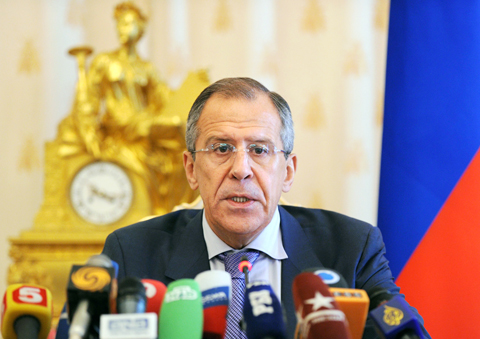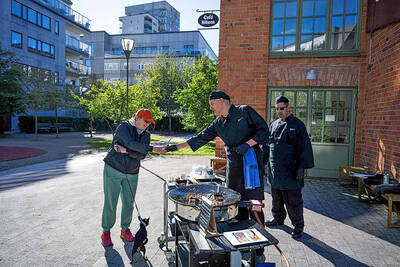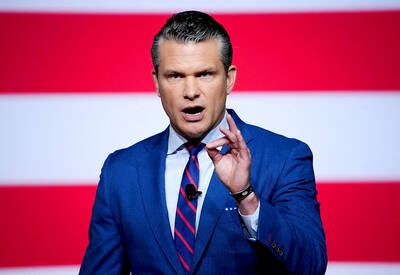US President Barack Obama’s administration is unveiling a new nuclear weapons policy that seeks to narrow the circumstances under which the US would use such weapons while preserving long-standing assurances of nuclear protection for allies, US officials said.
It is a delicate balance that the administration will describe in a policy document, called a nuclear posture review, that was to be released yesterday following a full year of deliberation led by the Pentagon and consultations with allied governments.
The document is expected to include language reducing US reliance on nuclear weapons for its national defense by narrowing potential US nuclear targets. That reflects Obama’s pledge to move toward a nuclear free world, and could strengthen US arguments that other countries should either reduce stockpiles of nuclear weapons or forego developing them.

PHOTO: AFP
The review of nuclear weapons policy is the first since 2001 and only the third since the end of the Cold War two decades ago.
The White House also planned to urge Russia to begin talks on adopting first-ever limits on shorter-range nuclear weapons, an arena in which Russia holds an advantage, said the officials who spoke on condition of anonymity because they were not authorized to discuss details of the nuclear policy review prior to its release.
These would be follow-on negotiations to the newly completed “New START” treaty reducing long-range nuclear weapons — to be signed by Obama and Russian President Dmitry Medvedev in Prague tomorrow.
The officials said the administration’s new policy would stop short of declaring that the US would never be the first to launch a nuclear attack, as many arms control advocates had recommended. However, it would describe the weapons’ purpose as “primarily” or “fundamentally” to deter or respond to a nuclear attack.
The officials said the document would say it is a US goal to move toward a policy in which the “sole purpose” of nuclear weapons is to deter or respond to nuclear attack. That wording would all but rule out the use of such weapons to respond to an attack by conventional, biological or chemical weapons. Previous US policy was more ambiguous.
In an interview with the New York Times on Monday, Obama said his administration was explicitly committing not to use nuclear weapons against non-nuclear states that are in compliance with the Nuclear Non-Proliferation Treaty, even if they attacked the US with biological or chemical weapons. Those threats, he told the newspaper, could be deterred with “a series of graded options” — a combination of old and newly designed conventional weapons.
The Obama administration plans to urge Russia to return to the bargaining table following Senate ratification of the new START arms reduction treaty. The White House hopes to overcome Russia’s expressed reluctance to move beyond START, especially if it means cutting Moscow’s arsenal of tactical, or short-range nuclear arms.
Russian Foreign Minister Sergei Lavrov said yesterday the treaty to be signed tomorrow takes relations between the two former Cold War foes to a new level.
The treaty “reflects a new level of trust between Moscow and Washington,” Lavrov told reporters ahead of the formal signing ceremony.

READINESS: According to a survey of 2,000 people, 86 percent of Swedes believe the country is worth defending in the event of a military attack Swedes are stocking up on food items in case of war, as more conflict in Europe no longer feels like a distant possibility, and authorities encourage measures to boost readiness. At a civil preparedness fair in southwest Stockholm, 71-year-old Sirkka Petrykowska said that she is taking the prospect of hostilities seriously and preparing as much as she can. “I have bought a camping stove. I have taken a course on preservation in an old-fashioned way, where you can preserve vegetables, meat and fruit that lasts for 30 years without a refrigerator,” Petrykowska said. “I’ve set aside blankets for warmth, I

FRUSTRATIONS: One in seven youths in China and Indonesia are unemployed, and many in the region are stuck in low-productivity jobs, the World Bank said Young people across Asia are struggling to find good jobs, with many stuck in low-productivity work that the World Bank said could strain social stability as frustrations fuel a global wave of youth-led protests. The bank highlighted a persistent gap between younger and more experienced workers across several Asian economies in a regional economic update released yesterday, noting that one in seven young people in China and Indonesia are unemployed. The share of people now vulnerable to falling into poverty is now larger than the middle class in most countries, it said. “The employment rate is generally high, but the young struggle to

ENERGY SHIFT: A report by Ember suggests it is possible for the world to wean off polluting sources of power, such as coal and gas, even as demand for electricity surges Worldwide solar and wind power generation has outpaced electricity demand this year, and for the first time on record, renewable energies combined generated more power than coal, a new analysis said. Global solar generation grew by a record 31 percent in the first half of the year, while wind generation grew 7.7 percent, according to the report by the energy think tank Ember, which was released after midnight yesterday. Solar and wind generation combined grew by more than 400 terawatt hours, which was more than the increase in overall global demand during the same period, it said. The findings suggest it is

‘ARMED CONFLICT’: At least 21 people have died in such US attacks, while experts say the summary killings are illegal even if they target confirmed narcotics traffickers US forces on Friday carried out a strike on an alleged drug-smuggling boat off the coast of Venezuela, killing four people, US Secretary of Defense Pete Hegseth said. The latest strike, which Hegseth announced in a post on X, brings the number of such US attacks to at least four, leaving at least 21 people dead. An accompanying video shared by Hegseth showed a boat speeding across the waves before being engulfed in smoke and flames. “Four male narco-terrorists aboard the vessel were killed,” the Pentagon chief wrote. He said the strike “was conducted in international waters just off the